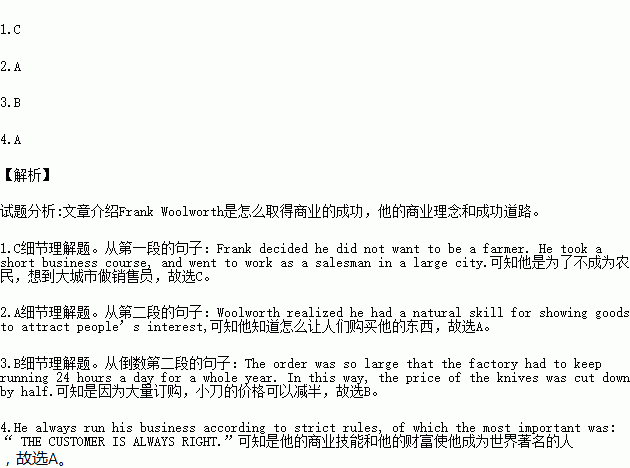题目内容
Frank Woolworth was born in Rodman, New York., in 1852. His family were very poor farmers, and there was never enough to eat. Frank decided he did not want to be farmer. He took a short business course, and went to work as a salesman in a large city.
Woolworth realized he had a natural skill for showing goods to attract people’s interest, but he soon learned something more important. One day his boss told him to sell some odds and ends (小商品 ) for as much as he could get. Frank put all these things on one table with a sign which said FIVE CENTS EACH. People fought and pushed to buy the things and the table was soon cleared.
Soon afterwards, Woolworth opened his own store., selling goods at five and ten cents. But he had another lesson to learn before he became successful. That is, if you want to make money by selling low-price goods, you have to buy them in large quantities directly from the factories. Once, for example, Woolworth went to Germany and placed an order for knives. The order was so large that the factory had to keep running 24 hours a day for a whole year. In this way, the price of the knives was cut down by half.
By 1919, Woolworth had over 1000 stores in the US and Canada, and opened his first store in London. He made many millions and his name became famous throughout the world. He always run his business according to strict rules, of which the most important was: “ THE CUSTOMER IS ALWAYS RIGHT.”
1.Frank took a short business course in order to ____________.
A. earn more money for his family
B. learn something from a salesman
C. get away from the farm
D. get enough to eat.
2.Frank sold the odds and ends quickly because _____________.
A. he knew how to get people to buy his goods.
B. he cut down the price by half
C. he had put the goods on a table in a very nice way.
D. the sign he put on the table was well designed.
3.The price of the knives was cut down by half because ______________.
A. the factory workers worked 24 hours a day.
B. knives were ordered in large quantities directly from the factory.
C. the knives were made in Germany, where labour (劳动力) was cheap.
D. the knives were produced in one factory.
4._____________ make Woolworth a world-famous man.
A. His business skills and his wealth.
B. The low price of the goods he sold.
C. His trip to Germany and his huge order of knives.
D. His natural skill for showing things.
 阅读快车系列答案
阅读快车系列答案
